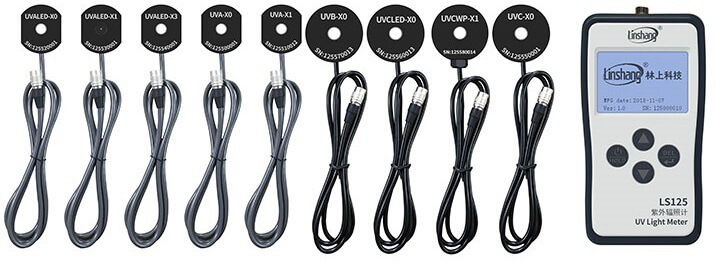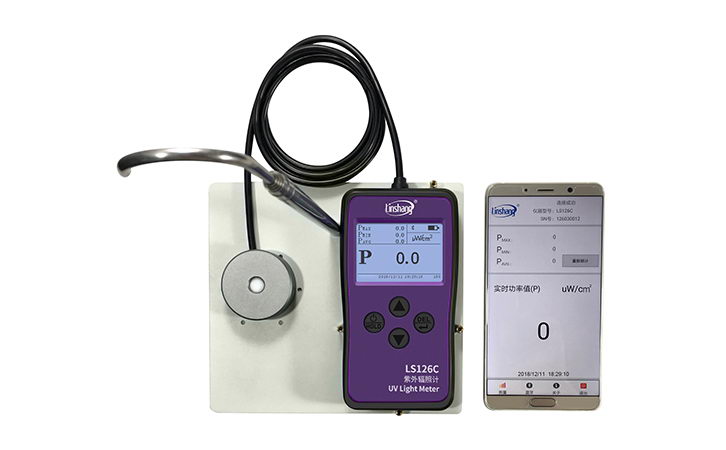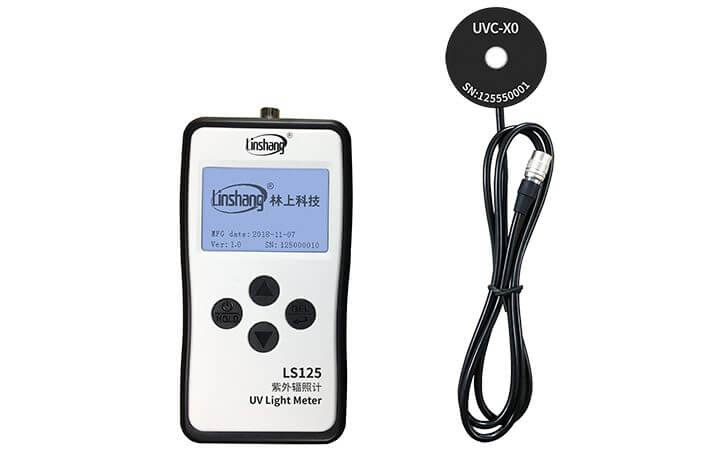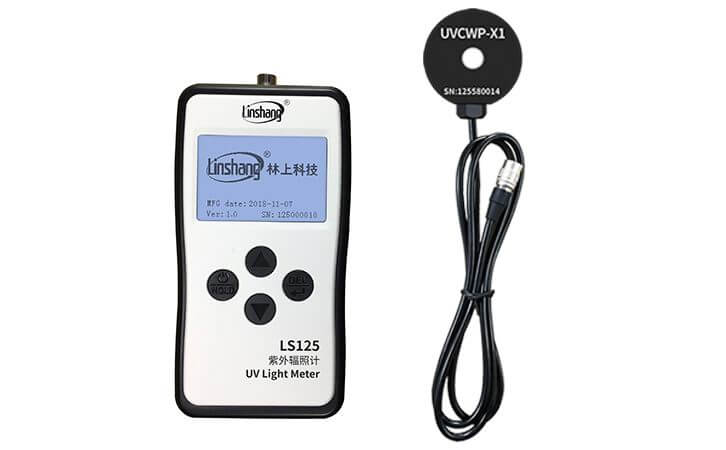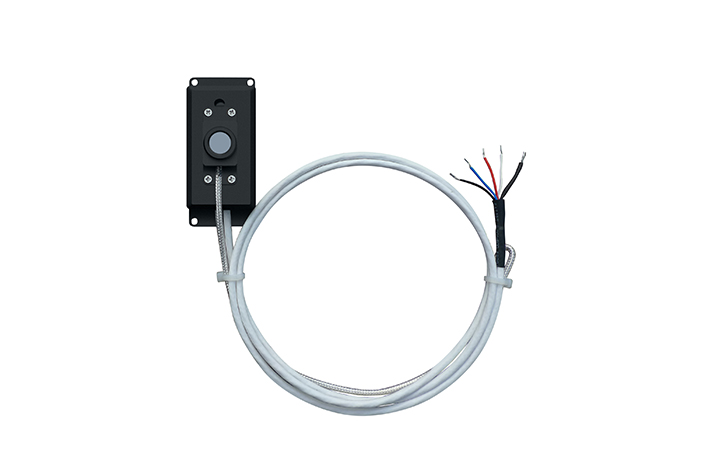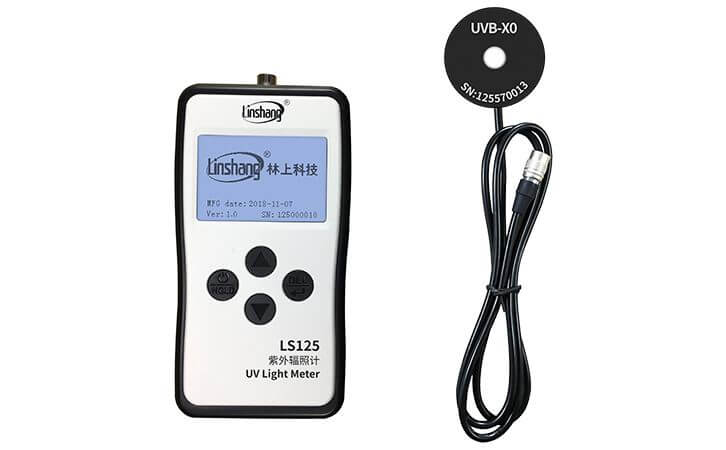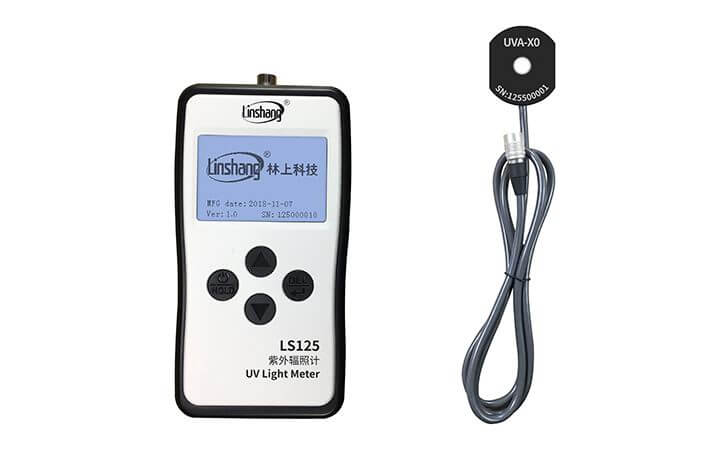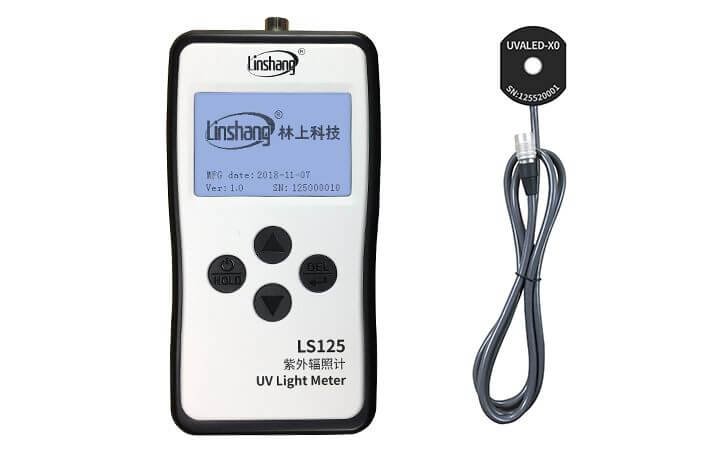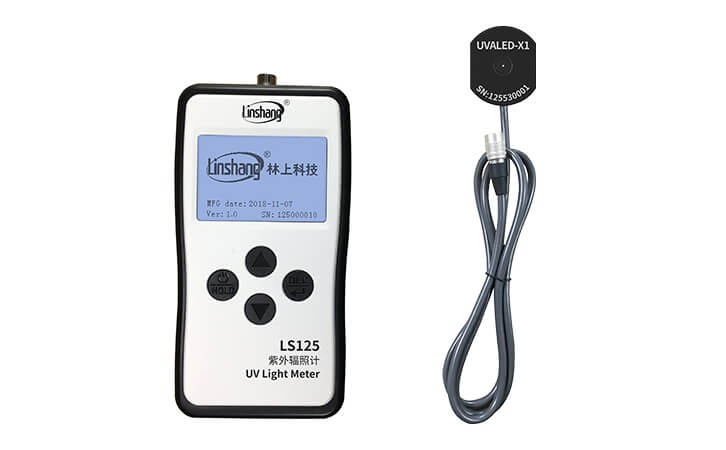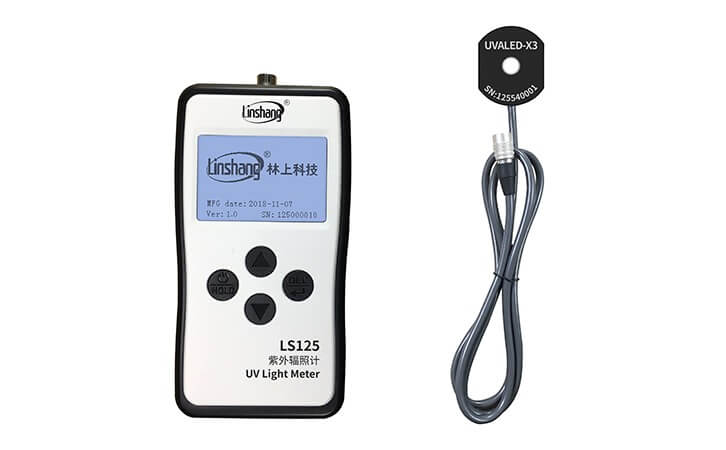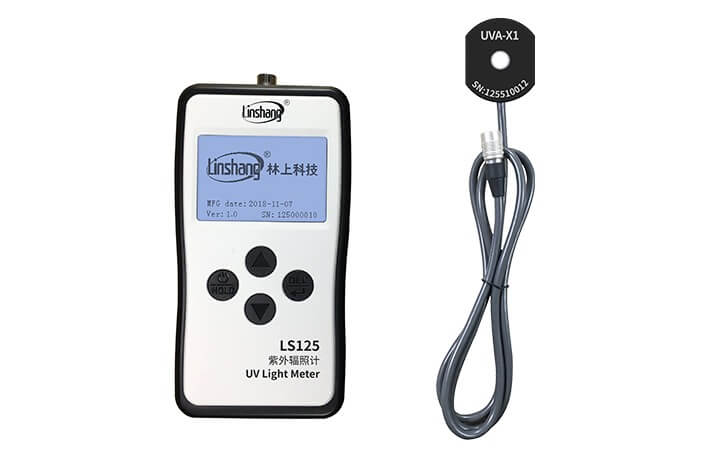How to Select the Best UV Light Meter For Your Application?
The biological effects of ultraviolet rays in different wavelength bands are different. With the continuous research on ultraviolet rays, ultraviolet light sources have been used more and more widely in various fields.
For example, in the medical field, UV-C is mainly used for disinfection and sterilization. UV-B can be used to treat skin diseases. In some production-oriented enterprises, UV-A is required to process and treat products, such as UV glue curing and ink drying. , photoresist exposure, etc. In the process of using an ultraviolet light source, it is essential to control the uv light irradiation intensity. Too high or too low UV light intensity will bring different effects.

I. How do you measure UV light intensity?
UV meter is a measuring device used to detect the UV light radiation intensity, also known as uv light measurement equipment. Due to the different needs of different industries for the UV light measurement and the diversity of UV light sources, UV intensity meter manufacturers have developed different types of UV light meters according to types of UV light sources.
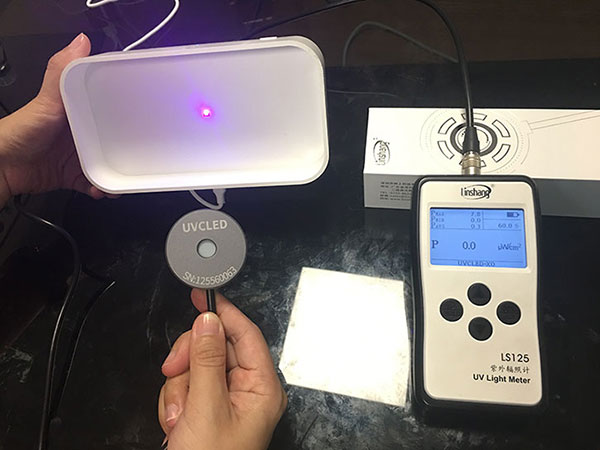
II. Why do we use UV light meter to measure UV intensity?
Although the types of ultraviolet light sources used in different industries are different, UV light sources have a common material property. They will experience a decrease in UV radiation intensity with the increase of the use time. In various industries, the UV radiation intensity of ultraviolet light tubes and the UV illumination time is an indicator that needs to be strictly controlled, so it is necessary to use an UV light meter to detect the UV light intensity.
III. How to Select the Best UV Light Meter For Your Application?
According to different application fields and ultraviolet wavelengths, we provide the following three types of ultraviolet light measurement equipment, as shown in the figure below. Users can choose the best UV intensity meter according to the recommendations below.
| Classification | Application | UV light meter model | Wavelength |
|---|---|---|---|
| Medical UV light meter | Medical germicidal lamp | LS126C | 230-280nm |
| Multiple probe UV light meter | Large power germicidal lamp | LS125 host+UVC-X0 | 230-280nm |
| Multiple probe UV light meter | Waterproof germicidal lamp | LS125 host+UVCWP-X1 | 230-280nm |
| Multiple probe UV light meter | LED germicidal lamp | LS125 host+UVCLED-X0 | 200-400nm |
| Multiple probe UV light meter | Power and energy detection of UVB |
LS125 host+UVB-X0 | 280-315nm |
| Multiple probe UV light meter | High pressure mercury lamp | LS125 host+UVA-X0 | 315-400nm |
| Multiple probe UV light meter | Power and energy detection of UVA |
LS125 host+UVA-X1 | 315-400nm |
| Multiple probe UV light meter | LED area light sources | LS125 host+UVALED-X0 | 340-420nm |
| Multiple probe UV light meter | LED point light sources | LS125 host+UVALED-X1 | 340-420nm |
| Multiple probe UV light meter | Power and energy detection of UVA LED |
LS125 host+UVALED-X3 | 340-420nm |
| Online UV monitor | High pressure mercury lamp | LS129-UVA | 315-400nm |
| Online UV monitor | LED curing lamp | LS129-UVALED | 340-420nm |
| Online UV monitor | UVC germicidal lamp | LS129-UVC | 230-280nm |
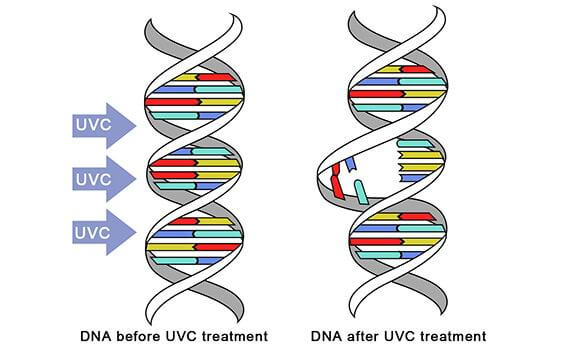
1. UV-C light intensity measurement of UV-C germicidal lamp
Inradiation of ultraviolet rays in the UVC band (mainly 230nm-280nm) to microorganisms such as bacteria and viruses will destroy the molecular structure of DNA (deoxyribonucleic acid) or RNA (ribonucleic acid) in the cells of microorganisms, causing DNA strand breaks. The cross-linking of the protein is broken, causing growth cell death and regenerative cell death, achieving the effect of sterilization.
(1)UV light measurement of medical sterilization low-pressure mercury lamp
(2) UV light measurement of high-power sterilization low-pressure mercury lamp
(3) UV light measurement of water treatment sterilization low-pressure mercury lamp
(4) UV light measurement of UVC LED germicidal lamp
(5) UV light online measurement of UVC germicidal lamp
2. UV light measurement of UV-B ultraviolet lamp
3. UV light measurement of UVA ultraviolet lamp
(1) UV light intensity measurement of high-pressure mercury lamp for curing
(2) UV light intensity measurement of UVA LED area light source for curing
(3) UV light intensity measurement of UV-A LED point light source for curing
(4) UV light intensity measurement of other UVA band ultraviolet lamps
4. UV light intensity measurement in other classic industries
(1) UV light measurement of sunlight and ultraviolet rays in the environment
It is recommended to use LS125 UV light meter with UVA-X1 and UVB-X0 probes.
(2) Nondestructive testing
It is recommended to use LS125 UV light meter with UVA-X1 probe.
(3) UV light measurement of insect trap light and fly killer light
It is recommended to use LS125 UV light meter with UVA-X1 probe.
(4) UV LED light source intensity measurement in air sterilizer
It is recommended to use LS125 UV light meter with UVCLED-X0 probe.
(5) UV light intensity measurement in UV aging box
UVA-340 light source: LS125 UV light meter is recommended with UVA-X1 probe.
UVB-313 light source: LS125 UV light meter is recommended with UVB-X0 probe.
(6) UV light intensity measurement in welding arc
Main frequency 365nm detection: It is recommended to use LS125 UV light meter with UVA-X1 probe.
Main frequency 290nm detection: It is recommended to use LS125 UV light meter with UVB-X0 probe.
Main frequency 254nm detection: LS125 UV light meter is recommended with UVC-X0 probe.
IV. How do you use a UV light meter?
1. LS126C medical UV light meter
LS126C is a UV light meter designed for medical ultraviolet germicidal lamps and "WST 367-2012 Regulation of disinfection technique in healthcare settings". It is equipped with a 1-meter hook. Hanging the UV light meter on the hook during measurement can ensure that the measurement meets the technical specifications. In addition, the LS126C UV light meter can use the mobile phone APP to realize the function of airspace monitoring data, avoiding the direct contact between testers and ultraviolet rays.
2. LS125 multi-probe UV light meter
LS125 is a host with multiple UV probes. Users can choose corresponding probes for testing according to different test needs. If there are multiple needs, you can also buy a host with multiple probes, saving cost and easy operation.
V. FAQ of uv light meters
-
1. What is UV wavelength range?
According to different biological effects of ultraviolet rays, ultraviolet rays can be divided into the following four bands according to the wavelength. The current LS125 multi-probe UV light meter is also mainly classified according to the three bands of UVA, UVB and UVC.
(1) UV-A band
The wavelength is 315-400nm, also known as long-wave black spot effect ultraviolet rays. UVA has a strong penetrating power and can penetrate most transparent glass and plastic. More than 98% of the long-wave ultraviolet rays contained in sunlight can penetrate the ozone layer and clouds to reach the earth's surface.
(2) UV-B band
The wavelength is 280 ~ 315nm, also called medium wave erythema effect ultraviolet. Its shorter wavelength will be absorbed by transparent glass. Most of the medium-wave ultraviolet rays contained in sunlight are absorbed by the ozone layer and only less than 2% can reach the surface of the earth. It will be particularly strong in summer and afternoon.
(3) UV-C band
The wavelength is 200-280nm, also known as short-wave sterilization ultraviolet. It has the weakest penetrating power and cannot penetrate most transparent glass and plastic. The short-wave ultraviolet rays contained in sunlight are almost completely absorbed by the ozone layer.
(4) UV-D band
Vacuum ultraviolet light, with a wavelength of 100 ~ 200 nanometers, has very weak penetrating ability and it can oxidize oxygen in the air to ozone.
-
2. UV light intensity measurement units conversion
UV intensity units are mainly μW / cm², mW / cm², W / cm² and W / m².
Conversion of UV intensity unit: 1W / cm² = 1 × 10 ^ 3 mW / cm² = 1 × 10 ^ 4 W / m² = 1 × 10 ^ 6 μW / cm²
The multi-probe UV light meter LS125 independently developed by Linshang Technology provides multiple units to choose from. Users can choose the corresponding unit according to their own measurement needs.
-
3. UV sterilization radiation intensity standard
During sterilization, if the intensity of UV radiation is high enough, the inactivated virus bacteria will not be revived. But if the radiation intensity is too low, the virus bacteria inactivated by UV radiation can repair the damaged structure by light. Therefore, an UV light meter is needed to ensure that the irradiation intensity of the ultraviolet disinfection lamp is higher than the standard value.
"WST 367-2012 Regulation of disinfection technique in healthcare settings" stipulates that after turning on the UV germicidal lamp for 5 minutes, the probe of the UV light meter with a measuring wavelength of 253.7nm needs to be placed at a vertical distance of 1m directly below the tested UV lamp (special UV lamp needs to be placed at the recommended distance for measurement. The data shown after the UV light meter is stable is the irradiance value of the UV lamp).
The standard of ordinary 30W straight tube type ultraviolet lamp is as follows: the irradiation intensity of the new lamp should meet the requirements of GB 19258; the use of ultraviolet lamp irradiation intensity ≥70μW / cm² is qualified; the irradiation intensity of 30W high intensity ultraviolet lamp ≥ 180μW / cm² is qualified.
-
4. How long does it take to sterilize with UV light?
The length of UV sterilization needs to be treated differently depending on the type of bacteria or virus that needs to be killed. Ultraviolet radiation dose = ultraviolet radiation intensity × light duration. Only when a certain amount of UV radiation is reached can certain bacteria or viruses be killed.
Take the influenza virus as an example. To reach 99% inactivated influenza virus, a UV irradiation dose of 6600 µWs / c㎡ is required (the true UV irradiation dose unit is mJ / c㎡. In order to calculate the duration of the light, the unit is converted into µWs / c㎡). If a 30W straight tube medical sterilization lamp with an irradiation intensity of 90µW / c㎡ is used for sterilization, the duration of irradiation is 6600 ÷ 90≈73s, which is 1 minute and 13 seconds.
-
5. How does UV light kill water? How does UV light kill bacteria in water?
Taking over-flow sterilization equipment as an example, the principle of sterilization of ultraviolet germicidal lamps in water is such that the water flows through the periphery of a quartz tube that can penetrate ultraviolet rays, and the 254nm ultraviolet rays generated by ultraviolet lamps sterilize and sterilize water. Due to the rapid flow of water, the time it takes for the water to flow through the quartz jacket is no more than 1 second, so only high-intensity and high-power UV lamps can achieve the conventional sterilization effect, and the power of the UV lamps needs to be measured regularly with an UV light meter.
-
6. UV meter calibration
If the UV light meters are used too frequently or after a certain period of time, a certain degree of aging will occur. For example, the internal filter may be mildewed due to the humid storage environment. In addition, many factors may affect the accuracy of ultraviolet radiation intensity measurements. Therefore, it is recommended to periodically calibrate the UV light meter. The recommended calibration cycle is one year. Users can adjust the calibration cycle according to their own frequency of use and the accuracy of the instrument.
Institutions and hospitals can send UV light meters to regular third-party metrology agencies if they need to be calibrated before using medical UV light meters. If it is only necessary to ensure the accuracy of the measurement data, we recommend that custometers send the uv light meter back to the manufacturer for calibration. The UV light meter manufacturer can provide a recalibration report, but cannot provide an authoritative certification report.
-
7. What is the UV light meter measurement principle?
The UV light meter can measure the power (intensity) or energy value of the received UV. Ultraviolet is an electromagnetic radiation that has a shorter wavelength than visible light, but a longer wavelength than X-rays. The ultraviolet sensor can convert one energy signal received into another energy signal and the output signal is an electrical signal; The built-in analog-to-digital conversion chip (ADC) can convert the weak current signal into a digital signal. The digital signal collected by single-chip microcomputer will be adjusted and recorded.The obtained power value will be used to calculate the UV energy value or generate other graphics and measurement reports.
